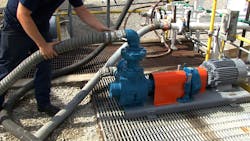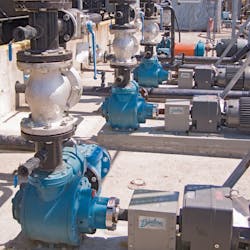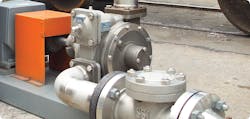Why sliding vane pumps work well in soap manufacturing
Soaps and detergents serve as an imperative part of our lives, one that would make life much more challenging without modern advances. Before the days of stacked shelves with a wide variety of cleaning choices, soaps were simply a combination of boiled fats, oils and ashes.
During World War I, however, a shortage of fats lead to the invention of synthetic detergents, which evolved into manufacturers producing the varieties we see today. Soap and detergent production now consists of merging fatty acids with alkali, glycerin or sulfuric acid. While that sounds straightforward, the production process is anything but.
The soap and detergent market has four segments — laundry and fabric washing; household cleaners; personal cleansing products; and dishwashing cleaners. With this variety of cleaners, manufacturers need equipment that can process a wide range of raw materials, each with its own complexities.
If manufacturers want a reliable way to handle the varying materials in soap and detergent processing, then their best bet is to use positive displacement sliding-vane pumps. This article will review why sliding vane pumps are well suited in this application.
Bring on the soap
The composition of sliding vane pumps makes them ideal for soap and detergent manufacturing, especially over comparable pumping technologies. Sliding vane pumps feature a rotor with retractable vanes that protrude and retract as the rotor operates. This setup creates chambers for liquid to pool into, while the next vane pushes it to the discharge side of the pump.
Its composition alone makes sliding vane pumps useful in soap and detergent processing. The self-adjusting sliding vanes sustain the pump’s volumetric performance, making the pump energy efficient while also preventing product slip. While vanes do wear over time, a worn vane simply protrudes further out of its rotor slot, ensuring that tight internal clearances remain consistent. The pump’s ability to sustain volumetric consistency ensures that it will run effectively and efficiently over its lifetime.
Another feature of the sliding vane pump is the lack of metal-to-metal contact, commonly found in other pumping technologies, such as gear pumps. When metal-to-metal contact occurs frequently, the possibility of pump friction and galling increases. Sliding vane pumps don’t suffer from these problems due to their construction, which also aids in the pump’s longevity.
Sliding vane pumps are also known for their ability to handle a wide range of liquid viscosities. This attribute is useful in soap and detergent processing because of the variety of raw materials with varying viscosities. Sliding vane pumps can handle liquids with viscosities as low as 0.2 cP and as high as 22,500 cP, while also experiencing no adverse performance effects when processing liquids between 3 to 100 cP and 100 to 5,000 cP.
Sliding vane pumps also can handle liquids with small particulates up to 25 percent concentrations, a useful attribute when disposing of waste fats after manufacturing soap. This ability stems from shear-sensitive open flow paths within the pump chamber and slow internal flow velocities that gently pass solids through the internal flow stages. The particles are not moved violently through the pump casing, as is the case with pump styles that rely on high internal flow velocities to operate effectively.
Another attribute beneficial to sliding vane pumps is their self-priming ability and their suction lift capabilities. This pump technology can create an internal vacuum strong enough to strip and lift valuable soap and detergent materials out of the lines, pumps and tanks. Operators don’t have to worry about losing raw materials and processed ingredients inside their equipment.
Sliding vane pumps also are available in materials that work well with the soap and detergent manufacturing process. Housings are available in stainless steel or ductile iron, while the vanes themselves can be made from a variety of materials that pair well with soaps and detergents.
Soap and detergent manufacturing is not a simple process, but sliding vane pumps are one of the most compatible pumping technologies in these applications. Their ability to handle multiple liquids with different viscosities, as well as their volumetric efficiency and consistency with several raw materials, make them a reliable choice for manufacturers.
Mark Pyk is the Product Marketing Manager for Blackmer. He can be reached at [email protected]. Blackmer is a leading brand of sliding vane, centrifugal, screw and regenerative turbine pump, and reciprocating gas compressor technologies and a product brand of PSG, a Dover company, Oakbrook Terrace, Illinois.
About the Author
Mark Pyk
Mark Pyk is the Product Marketing Manager for Blackmer®. He can be reached at [email protected]. Blackmer® is a leading brand of sliding vane, centrifugal, screw and regenerative turbine pump, and reciprocating gas compressor technologies and a product brand of PSG®, a Dover company, Oakbrook Terrace, IL, USA. PSG is comprised of several leading brands, including Abaque™, All-Flo, Almatec®, Blackmer®, Ebsray®, em-tec, EnviroGear®, Griswold®, Hydro Systems, Mouvex®, Neptune™, Quantex™, Quattroflow™, RedScrew™ and Wilden®. For more information on EnviroGear or PSG, please go to envirogearpump.com or psgdover.com.
Illinois


